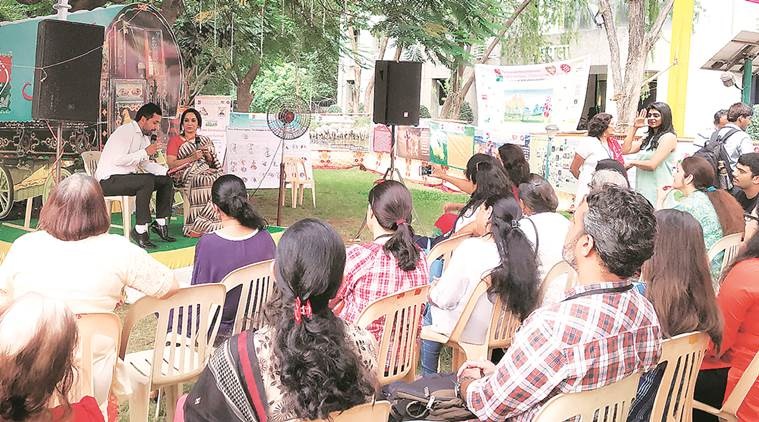 A session with author, writing coach and columnist Sudha Menon on her book Feisty at Fifty.
A session with author, writing coach and columnist Sudha Menon on her book Feisty at Fifty.
A large number of college students and young readers attended sessions of their favourite authors and speakers talked about politics, history and human rights, on the concluding day of the Pune International Literature Festival (PILF) on Sunday. According to PILF director Manjiri Prabhu, the festival aims to create an inspirational platform for all creative people, at all levels of their careers, and promote the culture of knowledge-based reading and learned appreciation of various arts and craft.
To mark 70 years of the ties between India and Italy, the Italian Ambassador to India, H E Lorenzo Angeloni, was the special guest at the inauguration along with author Shobhaa De. Other authors and speakers who participated in the event included gender activist Fadi Zaghmout, Vice-president of Salzburg Global Seminar in Austria, Benjamin Glahn.
In a session titled ‘Evolution of Human Rights — Are we there yet’, Glahn, when asked a question about the imbalance in prosecution of war crimes, said, “A court is being set up at the international level to prosecute crimes against humanity and crimes committed during war. But the larger and more powerful states have more of a prominent role in deciding what happens in the international system and I think there is a really urgent need to reform that system. Because it doesn’t function for the common good in all cases. US has committed crimes against humanity earlier and recently, but there has been no justice.”
Fadi Zaghmount, the gender activist, answering a question from a college student about spreading awareness of human rights at the individual level, said, “For a student, blogs and social media are great platforms to spread awareness about human rights.”
At the session ‘Being Shobhaa de’, Shobhaa De said, “We need more youngsters to be involved in political and social change. Unless you participate, don’t expect anything. You cannot expect advantages that a government can offer without participating and let the country be run by politicians of the older generation.”
When asked about trolling on social media, De said, “Twitter is an important tool for expression and I believe nothing can stop me. The passion inside me keeps me going every day.”
In the session ‘Power Women’, one of the speakers, Trupti Agarwal from Vishwakarma Publications, said, “Women are nurturing the younger generation as 70 per cent of educators in the academic field are women. Mentorship plays a vital role in the upliftment of an individual. We are here because of the women before us, who have inspired us to dream big.” Journalist Kaveree Bamzai said angry women are smarter as they get upset when something wrong happens around them and they take a stand against it.
“Anger is a very powerful emotion to tell a story. All
these historical judgments such as Sabarimala, LGBT, Section 497, came recently as the result of this anger among people against discrimination,” said Bamzai.
The festival brought many untold stories and experiences of many different writers and gave them a chance to share these with readers. In a reading session of the book ‘The boy who loved trains’, its author, Deepak Sapra, recalled the Bhopal Gas Tragedy and shared the story of the dedicated and courageous station master who saved thousands of lives that day. “The station master had sensed the wrong in the air and sent the trains at Bhopal station before their scheduled time and signalled other trains to take a diversion without thinking about himself. He collapsed after that. His bravery and alertness saved thousands of lives that night,” said Sapra.
Manjeet Hirani, author of the book ‘Life lesson from buddy’, said during the book launch that “one thing we should learn from dogs is letting go of our grudges”. “Animals never hold grudges and live in the moment. They just need some cuddling, care and touch of love to connect with you. This is what humans should learn from them.”
Bookstalls, the auditorium and each session were packed with enthusiastic readers from morning to evening. Even the rain could not dampen the spirit at the festival, and affected only one story-telling session.